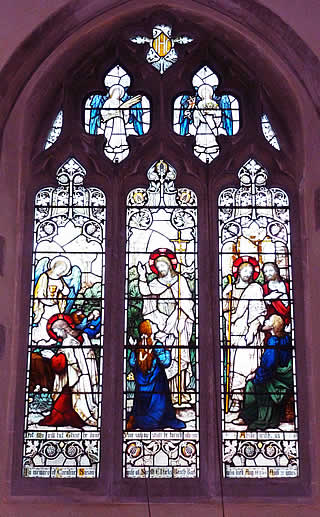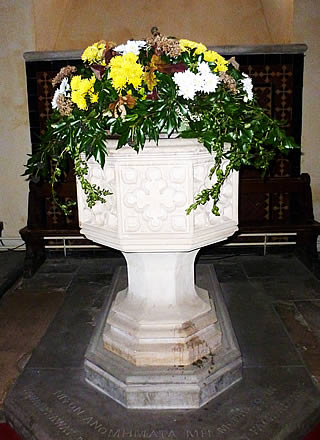

COLN ST ALDWYNS PARISH Church
CEMETERY INTERMENT GUIDELINES AND FEES
(Issue 4, 2013)
Introduction:
Anyone who was resident in the parish at the time of their death; or died in the parish; or was on the church electoral roll of the parish at the time of their death has the legal right to be buried or to have their ashes interred in any consecrated burial ground forming part of the churchyard of the Parish Church. This is regardless of belief.
Coln St Aldwyns is a small Cotswold village in a Conservation area and Area of Outstanding Natural Beauty. The village has two cemeteries. The first is the Church of England churchyard surrounding the Parish Church. This cemetery is full and closed by order of the Church of England. The second is a cemetery located near to the Post Office.
The Parish Church owns and is responsible for the maintenance of the second or `new` cemetery. The purpose of these guidelines is to set out the standards that the Church expects of the gravesite, who may be interred in the cemetery, how to apply for interment and the costs involved.
Standards expected of the gravesite.
Firstly, headstones, flat tablets or vases must comply with these Parish Church guidelines which in turn comply with the guidelines set out by the Diocesan Chancellor of Gloucester Diocese who from a legal point of view authorises the introduction of memorials into churchyards and cemeteries. The Chancellor has delegated certain powers to parish priests who must apply these regulations
Only headstones, flat tablets or stone vases constructed of local stone will be permitted to ensure that the overall appearance of the cemetery remains in keeping with its setting in the village. Construction in metal, marble or granite is not permitted.
Secondly, plants are not allowed to be planted on graves and cremation sites and we request that plastic flowers are not used. All withered flowers, whether natural or artificial, need to be removed in order to maintain the quality of the cemetery.
Thirdly, articles placed by relatives and friends on the burial/cremation stone should show respect for the solemnity of the area and be considerate to those buried/cremated nearby. This means that burial/cremation stones will usually only bear flowers (in holders). It will be necessary to consult the Parish Church via the PCC secretary or Church Warden if there is uncertainty about the appropriateness of the display that is being considered.
Burials
Each grave may accommodate two burials; a request for a double grave site must be made at the first burial. Burial headstones will only be allowed for burials provided they are secured by a ground anchoring system and do not exceed 900mm in height, 600mm in width and 100mm in thickness and are securely fixed onto a plinth not exceeding 900mm x 100mm. Memorial vases shall not exceed 300mm x 250mm x 200mm. No other ornaments of any description will be allowed. Bulbs may be planted on a grave but no other plantings, nor fencing or edging of any kind will be permitted. The Church reserves the right to request alterations are made to plots or to request the removal of any objects in order that plots conform to the above.
Cremations
Each cremation site may accommodate two cremations; the request for a double cremation site must be made at the first cremation. Cremation tablets (laid in the ground) shall not exceed 300mm x 450mm, cremation headstones 510mm x 380mm and 100mm in thickness and vases shall not exceed 200mm x 150mm x 100mm. No other ornaments of any description will be allowed. Bulbs may be planted on cremation sites but no other plantings, nor fencing or edging of any kind will be permitted. The Church reserves the right to request alterations are made to plots or to request the removal of any objects in order that plots conform to the above.
It should be understood that the fee that is charged by the Church for interment does not imply private ownership of that piece of ground but rather the right for interment to take place. It is a contribution towards the ongoing costs of maintaining the cemetery to the environmental standards appropriate to a village of this beauty and to the standards that may be required in the future.
Who can be interred in the Parish Cemetery?
The following are the guidelines, which the Church will use to decide on who may be interred in the Parish Cemetery
The following people have the legal right to be buried or to have their ashes interred in the Parish Cemetery
A person who is resident in the parish at the time of their death
A person who died in the parish
A person who was on the electoral roll of the parish at the time of their death
Consideration will also be given to allowing past residents of Coln St Aldwyns to be buried or have their ashes interred in the Parish Cemetery. A previous resident is defined as an individual who has previously resided in a property within the parish of Coln St Aldwyns but has moved away. Considerations such as how long the person resided in the parish and the reasons why the person moved away will be influential on this judgement
The Church reserves the right in all circumstances to use its discretion in making decisions on who may be interred in the Parish Cemetery. The above represents the guidelines that will direct this judgement
The process of applying for interment in the Parish Cemetery.
The funeral director should contact the secretary to the PCC to gain permission for the deceased to be interred in the Parish Cemetery. In normal circumstances, the secretary will be able to provide this decision and agree the appropriate fee over the phone at the time of the request. In unusual circumstances, the secretary will need to contact the Vicar and Church Warden for a decision in which case around 72 hours may be needed before the secretary can respond.
After an interval of a few months to allow the ground to settle following a burial, the funeral director or stonemason can provide advice as to the design and cost of a headstone. A letter of application should be sent to the PCC secretary for authorisation to proceed with the headstone. Cremation tablets/stones will not need time for the ground to settle however a letter of application should still be sent to the secretary for authorisation to proceed with the cremation tablet/stone. The words on the burial headstone or cremation tablet/stone must be sent to the PCC secretary along with the letter of application for approval by the PCC before the stonemason begins his works.
Fees:
Burial of Coffin:£286 (Coln PCC £250 GlosDioc £36)
Headstone permission:£117 (Coln PCC £107 GlosDioc £10)
Total: £403 (Coln PCC £357 GlosDioc £46
Headstone amendment: £20 (Coln PCC £10 GlosDioc £10)
Cremation: £138 (Coln PCC £102 GlosDioc £36)
Tablet Permission: £62 (Coln PCC £51 GlosDioc £11)
Total: £200 (Coln PCC £153 GlosDioc £37)
Tablet amendment:
£20 (Coln PCC £10 GlosDioc £10)
These fees are paid through the Funeral Director or Monumental Mason. They should be sent to the PCC secretary. It should be noted that the fees are required to be paid by two cheques as per the table above. One cheque is for the fees payable to the Coln St Aldwyns Parochial Church Council and the second for the fees payable to the Gloucester Diocese Board of Finance. These fees do not include the costs charged by the Parochial Church Council for the funeral service or the costs charged by the stonemason for the headstone/cremation tablet.
